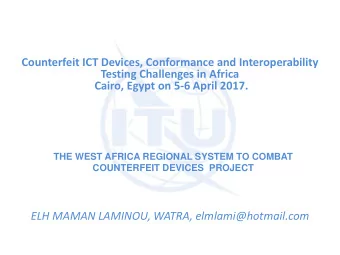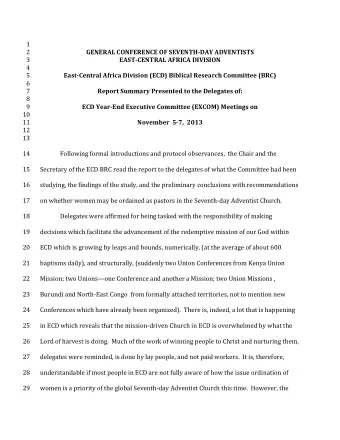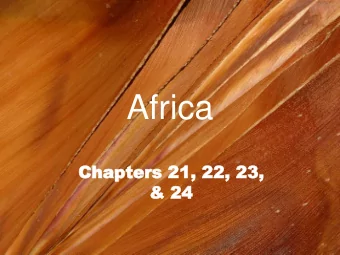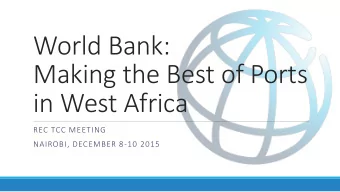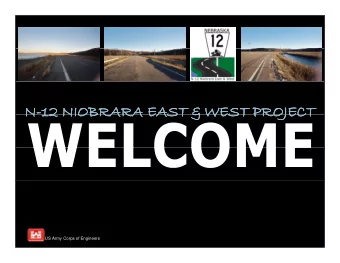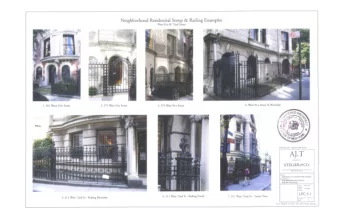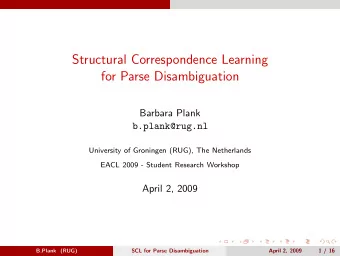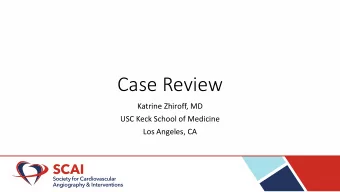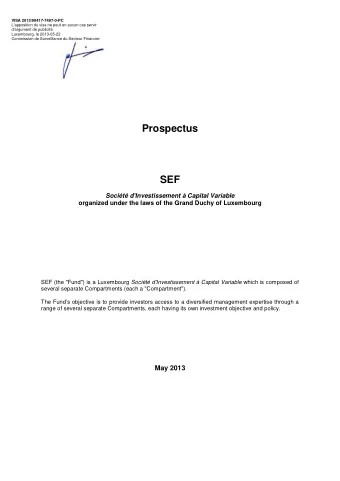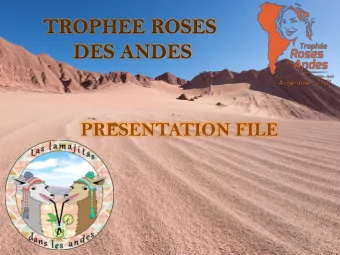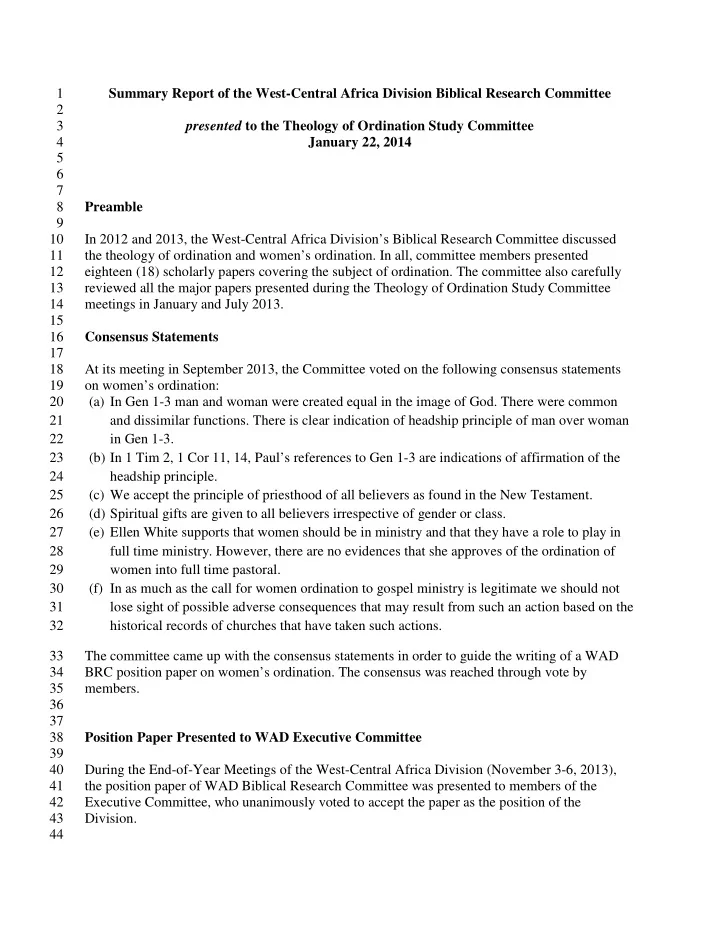
1 Summary Report of the West-Central Africa Division Biblical - PDF document
1 Summary Report of the West-Central Africa Division Biblical Research Committee 2 3 presented to the Theology of Ordination Study Committee 4 January 22, 2014 5 6 7 8 Preamble 9 10 In 2012 and 2013, the West-Central Africa Divisions
1 Summary Report of the West-Central Africa Division Biblical Research Committee 2 3 presented to the Theology of Ordination Study Committee 4 January 22, 2014 5 6 7 8 Preamble 9 10 In 2012 and 2013, the West-Central Africa Division’s Biblical Research Committee discussed 11 the theology of ordination and women’s ordination. In all, committee members presented 12 eighteen (18) scholarly papers covering the subject of ordination. The committee also carefully 13 reviewed all the major papers presented during the Theology of Ordination Study Committee 14 meetings in January and July 2013. 15 16 Consensus Statements 17 18 At its meeting in September 2013, the Committee voted on the following consensus statements 19 on women’s ordination: 20 (a) In Gen 1-3 man and woman were created equal in the image of God. There were common 21 and dissimilar functions. There is clear indication of headship principle of man over woman 22 in Gen 1-3. 23 (b) In 1 Tim 2, 1 Cor 11, 14, Paul’s references to Gen 1-3 are indications of affirmation of the 24 headship principle. 25 (c) We accept the principle of priesthood of all believers as found in the New Testament. 26 (d) Spiritual gifts are given to all believers irrespective of gender or class. 27 (e) Ellen White supports that women should be in ministry and that they have a role to play in 28 full time ministry. However, there are no evidences that she approves of the ordination of 29 women into full time pastoral. 30 (f) In as much as the call for women ordination to gospel ministry is legitimate we should not 31 lose sight of possible adverse consequences that may result from such an action based on the 32 historical records of churches that have taken such actions. 33 The committee came up with the consensus statements in order to guide the writing of a WAD 34 BRC position paper on women’s ordination. The consensus was reached through vote by 35 members. 36 37 38 Position Paper Presented to WAD Executive Committee 39 40 During the End-of-Year Meetings of the West-Central Africa Division (November 3-6, 2013), 41 the position paper of WAD Biblical Research Committee was presented to members of the 42 Executive Committee, who unanimously voted to accept the paper as the position of the 43 Division. 44
1 The paper overviewed the major biblical issues in the debate, including (1) headship in Gen 1-3; 2 (2) priesthood, prophetic ministry, and pastoral ministry; (3) the case of Deborah; (4) apostles, 3 overseers, and ordination; (5) headship in 1 Cor 11, 1 Cor 14, and 1 Tim 2; (6) “husband of one 4 wife” (1 Tim 3:2); (7) women, ministry, spiritual gifts and ordination; (8) the cases of Phoebe 5 and Junia; (9) the priesthood of all believers (Exod 19:4-6; 1 Pet 2:4-10; Rev 1:6; 5:10; 20:6); 6 and (10) Ellen White’s statements regarding headship and women’s ordination. 7 8 The paper concluded as follows: 9 10 Both Scripture and Ellen White seem to be consistent in their teaching of headship based on 11 Gen 2. What appears implicit in Gen 2 (before Fall) becomes explicit in Gen 3 (after Fall), is 12 taught in the New Testament (e.g., 1 Cor 11:2-16; 14:33-35; Eph 5:21-33; 1 Tim 2:11-15), 13 and affirmed by Ellen White (e.g., PP 46-57). The headship principle, being a creation order, 14 is applicable both in the husband-wife relationship at home and in the men-women 15 relationship in the church. This principle appears to have informed the selection of priests 16 (OT), apostles, overseers/elders (NT), and serves as the basis for Ellen White’s statements 17 with regards to spiritual leadership in the church. Women played several roles in the 18 covenant community both in the Old Testament (e.g., Miriam and Deborah) and in the New 19 Testament (e.g., Phoebe and Junia). Despite their engagement in ministry, however, Scripture 20 seems to be consistent in revealing that spiritual headship in the church is open to men who 21 meet certain other requirements for such function (e.g., 1 Tim 3). If the biblical portrait of 22 male headship is not influenced by pagan ancient Near Eastern culture, which we doubt, then 23 this principle should continue to guide the selection and ordination of individuals to pastoral 24 ministry today. 25 26 27 Recommendation 28 29 The West-Central Africa Division by consensus does not recommend the ordination of women 30 into ordained pastoral ministry. However, if at the General Conference Session the world church 31 votes in favor of women’s ordination, WAD will not threaten the unity of the church despite the 32 its disagreement to such a decision. Instead, we will consider women’s ordination as a matter of 33 conscience, and will continue to study and pray for light on the subject brighter than there is 34 now. 35 36 37 38 39 40 41 42 43 44 45 46
Highlights from WAD-BRC Position Paper 1 2 3 Issues in the Old Testament 4 5 1. Genesis 1-3 6 Gen 1 highlights the equality of man and woman; God creates them equal in nature (i.e., 7 image of God) and places stewardship responsibility on the two over the earth. Gen 2 speaks of 8 equality of man and woman as comparable partners but entrusts the man with leadership 9 responsibility within the human family. In Gen 3 the woman seems to take that responsibility 10 from the man (vv. 1-5, 12)—eating the fruit first and then having him eat next (vv. 6, 17)—and 11 drags the family into sin (vv. 7-8), but then God categorically reestablishes the headship of the 12 man over the woman (vv. 9-11, 16-19). This male headship principle in Gen 2-3 seems to serve 13 as the platform for male leadership attested in Scripture. Although both in Scripture and in 14 society male headship has been abused to the disadvantage of women, the headship principle has 15 its foundation in Scripture rather than paganism. The headship principle explains why Abraham, 16 not Sarah, is called and named the principal instructor in the family regarding the way of the 17 Lord (Gen 18:19). It explains why it is the patriarch who is the family priest (e.g., Gen 8:20; 18 12:7; 22:9). It also explains why it is men who serve in the army to protect wives and children 19 (Deut 20). Finally, it remains the best explanation for the selection of only males for the Israelite 20 priesthood, though this institution was further limited to a particular family (Exod 13; Num 3). 21 22 2. Priesthood vs. Prophetic Ministry 23 We conclude that pastoral ministry shares similarities as well as marked differences with 24 both priesthood and prophetic ministry in the Old Testament and that pastoral ministry does not 25 constitute an exact replica of either of these ministry patterns. If neither priesthood nor prophetic 26 ministry is sufficient model for pastoral ministry, then a theology and practice of ordination 27 cannot be based on one of the Old Testament ministries or the other. Stated differently, neither 28 the Levitical priesthood nor the prophetic ministry provides enough basis for the inclusion or 29 exclusion of women from ordained pastoral ministry. 30 31 3. The Case of Deborah 32 It appears that the Lord did not raise Deborah primarily as a deliverer-judge in Israel on 33 the same level as Othniel, Ehud, and Jephthah, for example. We find her judgeship to be 34 different in nature and scope from that of the other judges. Unlike these other judges who led the 35 Israelite army to battle, Deborah only encouraged Barak to take up the task of a deliverer-judge. 36 It follows that Barak was the judge in the true sense: he was ‘designated by the Lord Himself as 37 the one chosen to deliver Israel, and had received the assurance that God would go with him and 38 subdue their enemies’ [White, Daughters of God , 37] . . . In Judg 4-5, Deborah plays the role of 39 a prophetess rather than a judge. As the ‘mouth’ of God, she commands Barak to engage Sisera 40 in battle (4:6-7,14). She specifically calls herself a ‘mother in Israel’ (5:7)—a brave one! But 41 Barak does not request the presence of Deborah at the military camp because of her military 42 prowess but rather because she is the one through whom the Lord speaks (4:8). 43 The authority of Deborah to settle disputes would seem to result from her position as 44 prophetess instead of judge-deliverer. Her example does not violate the headship principle 45 established in Gen 2-3. As Ellen White states, Deborah ‘was known as a prophetess, and in the 46 absence of the usual magistrates, the people had sought to her for counsel and justice’ [ibid.] In
Recommend
More recommend
Explore More Topics
Stay informed with curated content and fresh updates.

